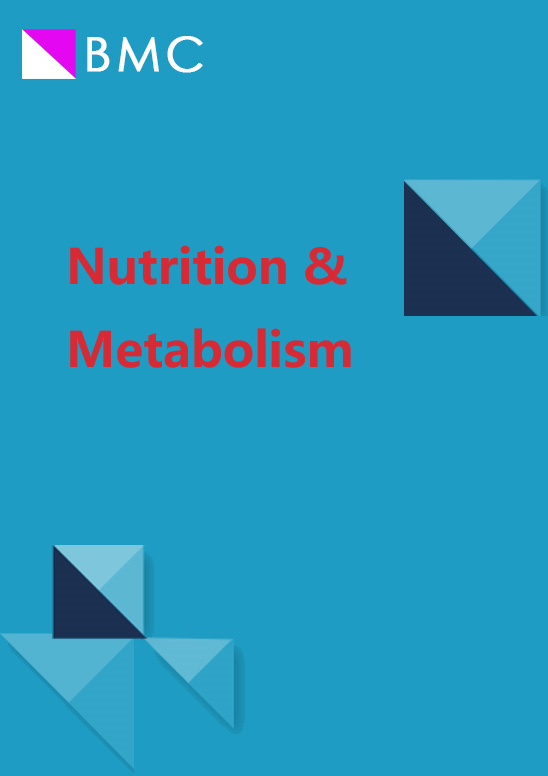乳清素食和地中海饮食干预对脂蛋白和炎症细胞因子的影响:CARDIVEG 研究的结果
IF 3.9
2区 医学
Q2 NUTRITION & DIETETICS
引用次数: 0
摘要
最近,有人提出将载脂蛋白作为心血管疾病(CVD)风险的新标志物。然而,有关饮食对脂蛋白影响的证据却很有限。目的:比较地中海饮食(MD)和乳制品素食(VD)对低至中度心血管疾病风险参与者的脂蛋白和传统心血管疾病风险因素的影响。52 名参与者(39 名女性;49.1 ± 12.4 岁)分别进行了为期 3 个月的地中海饮食和全素饮食研究。基线时收集了医疗和饮食信息。在干预开始和结束时采集人体测量参数和血液样本。MD 和 VD 可显著改善人体测量和血脂状况。两种饮食都降低了大多数炎症参数。至于脂蛋白,在 VD 后观察到载脂蛋白 C-I 发生了显著变化(+ 24.4%;p = 0.020)。MD导致载脂蛋白C-III与碳水化合物呈负相关(R = - 0.29;p = 0.039),而VD则导致载脂蛋白D与饱和脂肪呈负相关(R = - 0.38;p = 0.006)。VD 后,高密度脂蛋白和载脂蛋白之间呈正相关(R = 0.33;p = 0.017),MD 后,血浆甘油三酯和载脂蛋白 C-I 之间呈正相关(R = 0.32;p = 0.020),载脂蛋白 D 之间呈正相关(R = 0.30;p = 0.031)。IL-17与MD后的载脂蛋白B呈正相关(R = 0.31; p = 0.028),与VD后的载脂蛋白C-III呈正相关(R = 0.32; p = 0.019)。亚组分析显示,两种饮食对脂蛋白都有积极影响,尤其是对女性、50 岁以上或心血管疾病风险因素小于 3 个的人。两种饮食似乎都能改善心血管疾病风险,但在某些亚组中,MD 对脂蛋白的积极影响更大,这表明饮食可能会影响心血管疾病风险的新潜在指标。试验注册:2015 年 12 月在 clinicaltrials.gov 注册(标识符:NCT02641834)。本文章由计算机程序翻译,如有差异,请以英文原文为准。
Effects of a dietary intervention with lacto-ovo-vegetarian and Mediterranean diets on apolipoproteins and inflammatory cytokines: results from the CARDIVEG study
Apolipoproteins have been recently proposed as novel markers of cardiovascular disease (CVD) risk. However, evidence regarding effects of diet on apolipoproteins is limited. To compare the effects of Mediterranean diet (MD) and lacto-ovo vegetarian diet (VD) on apolipoproteins and traditional CVD risk factors in participants with low-to-moderate CVD risk. Fifty-two participants (39 women; 49.1 ± 12.4 years), followed MD and VD for 3 months each. Medical and dietary information was collected at the baseline. Anthropometric parameters and blood samples were obtained at the beginning and the end of interventions. MD and VD resulted in significant improvement in anthropometric and lipid profiles. Both diets led to a reduction in most of the inflammatory parameters. As for apolipoproteins, a significant change was observed for ApoC-I after VD (+ 24.4%; p = 0.020). MD led to a negative correlation between ApoC-III and carbohydrates (R = − 0.29; p = 0.039) whereas VD between ApoD and saturated fats (R = − 0.38; p = 0.006). A positive correlation emerged after VD between HDL and ApoD (R = 0.33; p = 0.017) and after MD between plasma triglycerides and ApoC-I (R = 0.32; p = 0.020) and ApoD (R = 0.30; p = 0.031). IL-17 resulted to be positively correlated with ApoB after MD (R = 0.31; p = 0.028) and with ApoC-III after VD (R = 0.32; p = 0.019). Subgroup analysis revealed positive effects on apolipoproteins from both diets, especially in women, individuals older than 50 years-old or with < 3 CVD risk factors. Both diets seem to improve CVD risk, however, MD showed a greater positive effect on apolipoproteins in some subgroups, thus suggesting how diet may influence new potential markers of CVD risk. Trial registration: registered at clinicaltrials.gov (identifier: NCT02641834) on December 2015.
求助全文
通过发布文献求助,成功后即可免费获取论文全文。
去求助
来源期刊

Nutrition & Metabolism
医学-营养学
CiteScore
8.40
自引率
0.00%
发文量
78
审稿时长
4-8 weeks
期刊介绍:
Nutrition & Metabolism publishes studies with a clear focus on nutrition and metabolism with applications ranging from nutrition needs, exercise physiology, clinical and population studies, as well as the underlying mechanisms in these aspects.
The areas of interest for Nutrition & Metabolism encompass studies in molecular nutrition in the context of obesity, diabetes, lipedemias, metabolic syndrome and exercise physiology. Manuscripts related to molecular, cellular and human metabolism, nutrient sensing and nutrient–gene interactions are also in interest, as are submissions that have employed new and innovative strategies like metabolomics/lipidomics or other omic-based biomarkers to predict nutritional status and metabolic diseases.
Key areas we wish to encourage submissions from include:
-how diet and specific nutrients interact with genes, proteins or metabolites to influence metabolic phenotypes and disease outcomes;
-the role of epigenetic factors and the microbiome in the pathogenesis of metabolic diseases and their influence on metabolic responses to diet and food components;
-how diet and other environmental factors affect epigenetics and microbiota; the extent to which genetic and nongenetic factors modify personal metabolic responses to diet and food compositions and the mechanisms involved;
-how specific biologic networks and nutrient sensing mechanisms attribute to metabolic variability.
 求助内容:
求助内容: 应助结果提醒方式:
应助结果提醒方式:


